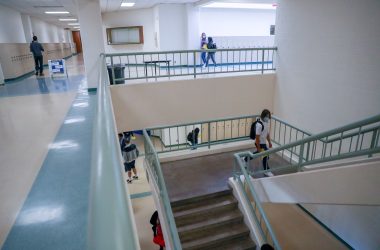 Nancy Ceja, field operations branch manager works at her desk in the Marion County Health and Human Services COVID-19 incident command on Monday, July 13. (Amanda Loman/Salem Reporter)
Nancy Ceja, field operations branch manager works at her desk in the Marion County Health and Human Services COVID-19 incident command on Monday, July 13. (Amanda Loman/Salem Reporter)
Covid claimed another victim this week – the database that is crucial for the Oregon Health Authority to track and investigate new Covid infections.
The state’s system needed a quick overnight fix as it struggled to keep pace with the rising number of new infections and tests in recent weeks. That in turned slowed local public health workers trying to stop the disease’s spread.
Those delays add to the time it takes health workers to notify someone they’ve been exposed to Covid or enter details about where an infected person has recently been.
Katrina Rothenberger, public health division director for Marion County, told county commissioners at a Dec. 2 meeting that lags in the state database had gotten so slow it wasn’t working at all that morning.
“This is how we do our work every day, so the fact that it’s not functioning is a significant issue and contributing to further disease spread in our state, because we cannot adequately investigate cases or be notified of these folks who have a positive test result,” Rothenberger said.
The database has been slow as the state has worked to change the way it counts Covid tests. Previously, Oregon recorded only one negative test per person even if they had multiple tests that came back negative. Certain health care workers, for instance, are routinely tested.
Now, the state is recording the result for each test, not just per person. That’s dramatically increased the amount of data to process.
“Due to the change in test reporting methodology for the past month OPERA has been running slower as all negative tests are integrated into the system, which has been equally frustrating for counties and the state,” Marion County spokesman Chad Ball said in an email.
Delia Hernández, a spokeswoman for OHA, said the system has lagged because of the “surge of users in the system as a response to the surge in cases.”
The state shut down the database overnight Wednesday for an upgrade, she said.
“We updated the system and are implementing other changes that will help address the slowness and improve the usability for people using OPERA,” Hernández wrote in an email. “We will continue to troubleshoot and try other changes if lags persist.”
Officials in Marion and Polk counties said the upgrade had improved lagging.
Quickly following up with people who test positive for or are exposed to Covid is important. People who don’t realize they’re infected can spread the virus before health workers to reach out and advise them to quarantine.
The lags are happening as Oregon is reporting over 1,000 new cases of Covid nearly every day and has set several daily records in the past week, leaving public health workers scrambling to keep up.
The number of new cases prompted OHA to scale back contact tracing efforts in mid-November. Now, instead of tracing down every known contact of an infected person, county workers can focus on reaching people exposed to Covid who are in high-risk categories such as health care workers or elderly people. Many of those who test positive are being encouraged to on their own alert their close contacts.
On Dec. 2, Marion County Health and Human Services said on Facebook that local health workers needed up to four days to reach infected people because of the volume of cases. The agency urged people who test positive to quarantine as soon as they get positive test results back from a clinic or health provider instead of waiting for a call from a county health worker.
In Polk County, the lags have been an issue for three weeks and have forced case investigators to at times take handwritten notes while interviewing people with Covid, then type the information into the database early in the morning or in the evening when there are fewer users, public health administrator Jacqui Umstead said.
“This can lead to a delay in contact tracing if we are unable to input the close contacts into OPERA in a timely manner, but for the most part we have been able to stay on top of this. We have also shifted some of the case investigator’s shift start and end times, to try to maximize our use of OPERA during ‘off times’,” Umstead said.
Umstead said the system was “very slow” on Wednesday, though it didn’t completely shut down. Following the upgrade, she said performance appears improved.
Contact reporter Rachel Alexander: [email protected] or 503-575-1241.
HOLIDAY SPECIAL: SAVE 25% off a one-year subscription to Salem Reporter. Get quality Salem news delivered to your inbox. Every subscription helps build coverage of the Salem community. Order online HERE.

Rachel Alexander is Salem Reporter’s managing editor. She joined Salem Reporter when it was founded in 2018 and covers city news, education, nonprofits and a little bit of everything else. She’s been a journalist in Oregon and Washington for a decade. Outside of work, she’s a skater and board member with Salem’s Cherry City Roller Derby and can often be found with her nose buried in a book.









